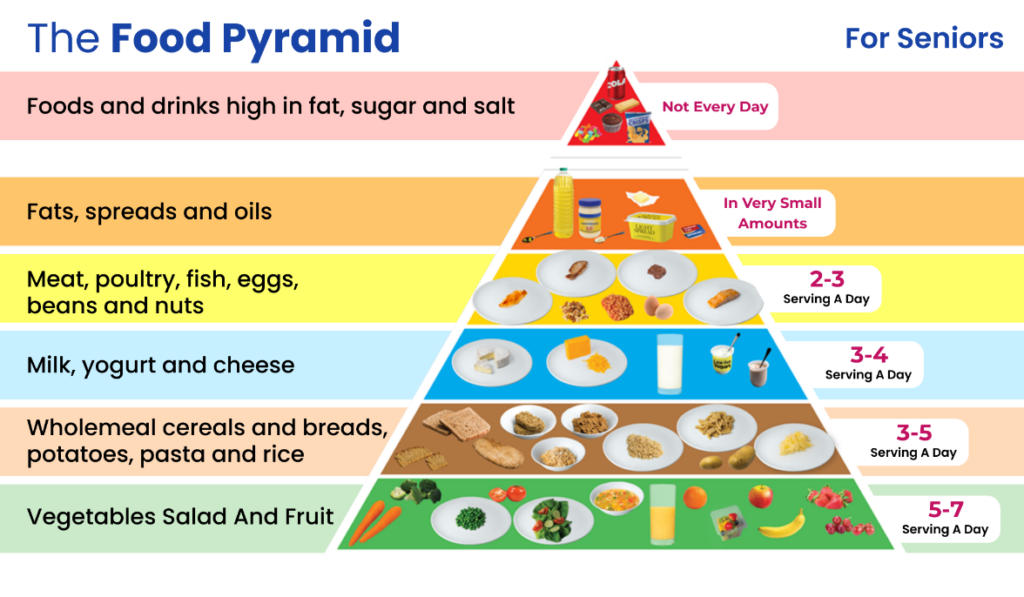Are You Getting the Right Nutrients? Common Deficiencies Seniors Shouldn’t Ignore
Nutrients for Seniors – Know the Right Food for You
Mr. Sharma, a retired 72-year-old teacher, always believed eating home-cooked meals was enough to stay healthy. But lately, he has felt exhausted, struggled with muscle cramps, and even had occasional dizzy spells. His daughter was worried and took him to the doctor, who found that he was deficient in magnesium and vitamin B12, which are essential for muscle and energy function. Like Mr. Sharma, many seniors unknowingly suffer from nutrient deficiencies, affecting their overall well-being.
Maintaining nutritional balance in old age is a formidable challenge. As we age, our bodies undergo changes that hinder nutrient absorption and intake. Nearly 20–30% of older persons suffer with anorexia of aging, a normal decrease in appetite that makes it challenging for them to achieve their nutritional demands. Eating can be difficult due to digestive problems, decreased salivation, and dental problems; changes in taste and smell further reduce the appealing nature of food.
Without proper nutrition, seniors face weakened immunity, muscle loss, and a higher risk of chronic diseases. So, how do you know if you’re not facing any nutritional deficiencies? Let’s explore the common deficiencies that one should never ignore in old age and how to overcome them.
1. Vitamin D: The Sunshine Vitamin – Nutrient for vitamin D deficiency
Mrs. Nair, a 68-year-old retired librarian, loved reading by her window but rarely stepped outside. Over time, she began experiencing joint pain and frequent colds. A routine check-up revealed she had a severe vitamin D deficiency, a common issue among seniors due to reduced sun exposure and decreased skin efficiency in producing this vital nutrient. Vitamin D helps the body absorb calcium. Low levels can lead to osteoporosis, frequent infections, and even mood disturbances.
Signs of deficiency:
- Fatigue and muscle weakness
- Joint pain or bone fractures
- Frequent colds or infections
Sources: The best source is sunlight, but seniors often need dietary sources like fortified dairy products, mushrooms, egg yolks, and supplements if levels are too low.
For Mrs. Nair, simple lifestyle changes—like daily morning walks and vitamin D-fortified foods—helped her regain strength and immunity.
2. Vitamin B12: The Energy and Memory Booster – Nutrient for Vitamin B12 deficiency
Mr. Kapoor, a 70-year-old retired banker, started forgetting small things—where he kept his glasses, his neighbour’s name, even whether he had taken his morning medicine. Initially, he dismissed it as normal aging, but when he took consultation, his doctor ran some tests. The culprit? Vitamin B12 deficiency.
Why it matters: Vitamin B12 is crucial for nerve function, red blood cell formation, and cognitive health. This deficiency is common in seniors due to reduced stomach acid, which is needed to absorb B12 from food.
Signs of deficiency:
- Memory lapses or confusion
- Tingling or numbness in hands and feet
- Dizziness and fatigue
Sources: Found mainly in dairy, eggs, fish, and fortified cereals, but since absorption declines with age, many seniors need B12 supplements or injections.
3. Calcium: The Bone Protector – Nutrient for calcium deficiency
At 69, Mrs. Mehta was an active grandmother who loved gardening. One day, while bending down to pick up a flowerpot, she felt a sharp pain in her back. A visit to the doctor revealed that she had osteopenia, a condition in which bones become weak due to calcium deficiency. Shocked, she realized that despite drinking milk daily, she was suffering from calcium deficiency, indicating adulteration in milk or her body not absorbing enough calcium.
Why it matters: Calcium is essential for bone strength, muscle function, and heart health. As we age, our bones lose density, increasing the risk of osteoporosis and fractures. Women, especially after menopause, are at higher risk due to hormonal changes.
Signs of deficiency:
- Frequent fractures or bone pain
- Muscle cramps or weakness
- Brittle nails and tooth decay
Sources: The best sources include milk, yogurt, cheese, leafy greens (like spinach and kale), almonds, and fortified plant-based milks. Seniors with low intakes may require calcium supplements along with vitamin D for better absorption.
4. Magnesium: The Relaxation Mineral – Nutrient for deficiency
Mr. Verma, a 73-year-old retired professor, often complained of restless nights and constant muscle cramps. He initially blamed it on aging, but when his fatigue and irritability worsened, his doctor tested his magnesium levels. The results? A significant deficiency—something surprisingly common among seniors.
Why it matters: Magnesium is crucial for muscle relaxation, nerve function, sleep quality, and heart health. Lacking in magnesium can lead to insomnia, muscle weakness, and even an irregular heartbeat. Many seniors unknowingly suffer from this deficiency due to poor diet, medication side effects, or reduced absorption.
Signs of deficiency:
- Muscle cramps or twitches
- Trouble sleeping or frequent headaches
- Anxiety, irritability, or brain fog
Sources: Found in nuts (almonds, cashews), seeds (pumpkin, chia), whole grains, leafy greens, bananas, and dark chocolate. For severe deficiencies, magnesium supplements may be recommended.
5. Omega-3 Fatty Acids: The Brain and Heart Guardian – Nutrient for sharp memory
Mrs. Desai, a 75-year-old former principal of a school, always took immense joy in her sharp memory. However, she had trouble concentrating lately and often lost familiar names. The physician advised her to consume more omega-3 fatty acids, which are vital for the brain and heart.
Why it matters: Omega-3s play a critical role in reducing inflammation, supporting brain function, improving heart health, and even alleviating joint pain.
Signs of deficiency:
Memory problems or difficulty concentrating
Joint stiffness and inflammation
Dry skin and brittle hair
Sources: The best sources include fatty fish (salmon, mackerel, sardines), flaxseeds, walnuts, chia seeds, and algae-based supplements for vegetarians.
6. Iron: The Oxygen Transporter – Nutrient for iron deficiency anaemia
Mr. Raghavan, a 70-year-old retiree, always had a good appetite, but recently, he noticed feeling unusually tired even after a full night’s sleep. He also had trouble climbing stairs and often felt dizzy. After a visit to his doctor, he learned he had iron deficiency anaemia, a condition where the body doesn’t have enough iron to produce haemoglobin, the protein that carries oxygen in the blood.
Why it matters: Iron is vital for oxygen transport and energy production. When iron levels are low, it can cause fatigue, weakness, and even shortness of breath. Seniors are more prone to iron deficiency, especially those with conditions like gastric issues or chronic diseases that affect absorption.
Signs of deficiency:
Fatigue and weakness
Shortness of breath or dizziness
Pale skin and brittle nails
Sources: Rich sources include red meat, poultry, lentils, spinach, beans, and fortified cereals. For those with dietary restrictions, iron supplements may be recommended alongside vitamin C to boost absorption.
Other Important Nutrients for Seniors
| Nutrient | Importance In Your Golden Years |
| Potassium | Helps maintain heart health and regulates blood pressure. Found in bananas, potatoes, and spinach. |
| Zinc | Boosts immunity, helps in wound healing, and supports cognitive function. Found in meat, shellfish, and legumes. |
| Vitamin C | Supports immune health and collagen production, essential for skin and bone health. Found in citrus fruits, bell peppers, and broccoli. |
| Vitamin A | Crucial for eye health, immune function, and skin. Found in carrots, sweet potatoes, and dark leafy greens. |
| Folate (Vitamin B9) | Supports cell division and DNA synthesis, important for brain and nerve health. Found in leafy greens, beans, and fortified cereals. |
Ensuring proper nutrition in old age doesn’t have to be overwhelming. By making small, sustainable changes, seniors can prevent deficiencies and maintain good health.
Here are some practical strategies:

- Follow the Food Pyramid Approach – A balanced diet should include a variety of foods from different groups. The base of the pyramid (grains, fruits, and vegetables) should make up most of the diet, followed by moderate portions of proteins (lentils, dairy, eggs, fish), and healthy fats (nuts, seeds, oils). Sugary and processed foods should be minimized.
- Prioritize Nutrient-Dense Foods – Seniors should focus on foods rich in vitamins and minerals rather than empty calories. Opt for whole grains, lean proteins, leafy greens, and dairy instead of processed or fried foods.
- Include Protein in Every Meal – Protein helps prevent muscle loss and keeps energy levels stable. Incorporate dairy, lentils, beans, eggs, or tofu into daily meals.
- Stay Hydrated – Dehydration is common among seniors due to reduced thirst sensation. Encourage drinking water, herbal teas, and fresh juices, and consuming water-rich foods like fruits and soups.
- Make Meals Social – Eating alone often leads to poor intake. Seniors can eat with family, join community meal programs, or invite friends over to make mealtimes enjoyable.
- Use Supplements When Necessary – Some deficiencies, like Vitamin D or B12, may require supplements if dietary intake isn’t sufficient. Always consult a doctor before starting supplements.
- Adapt Meals to Physical Needs – If chewing is difficult, opt for soft foods like mashed vegetables, yogurt, and smoothies. For seniors with cognitive decline, easy-to-prepare meals can help maintain proper nutrition.
- Regular Health Check-ups – Routine tests for Vitamin D, B12, iron, and calcium levels can help detect deficiencies early, allowing for timely dietary adjustments or supplementation.
How mySeniorCareHub Can Help
At mySeniorCareHub, we understand the unique challenges that seniors face when it comes to maintaining proper nutrition. Our app helps you to identify and monitor essential nutrients to ensure you’re meeting your dietary needs. With our Health Monitoring feature, you can track vital metrics like Blood Pressure and Blood Sugar, ensuring your nutritional intake is aligned with your overall health goals.
By utilizing mySeniorCareHub, you can stay on top of your nutrition, improve your well-being, and live a healthier, more independent life.









